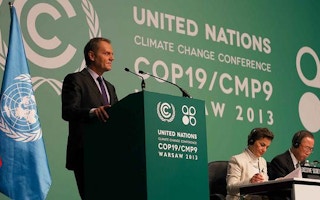The UN climate change talks, held from November 11 until November 22 in Warsaw, were more disappointing than expected.
During the two weeks, Japan and Australia back-flipped on their previous emissions reduction targets, and developed countries’ financial commitments for adaptation were far too modest. Pledges totalled US$100 million to sustain the Adaptation Fund, which is a far cry from the US$100 billion per year by 2020 that was promised in Copenhagen four years ago.
Midway through the Warsaw meeting, the president of the conference, Marcin Korolec, was sacked as the Polish environment minister because he hadn’t pushed new shale gas legislation through fast enough.
There was also limited resolve concerning future greenhouse gas targets for countries. This is critical in mapping out a path to Paris in 2015, which is supposed to be where countries will sign up for a new global climate deal.
Despite this, one positive ray of light emerged: the Warsaw Framework for REDD+ was established. This is funding to end deforestation and promote conservation, and is supported by the US, Norway and UK to the tune of US$280 million.
Arguing over “loss and damage”
The Warsaw meeting – known as COP19, because it’s the 19th global “Conference of the Parties” meeting on climate change – took place against the backdrop of the recent super typhoon Haiyan, which affected over 11 million people in the Philippines and other nearby nations.
Early on in the first week of the talks, the G-77 block of developing countries tabled a proposal to all countries for a “loss and damage” mechanism as a third separate pillar alongside mitigation and adaptation.
The idea would be to have funds available to provide critical assistance to countries hit by severe rapid-onset weather events and gradual climate change.
This was always going to be a highly contentious and emotionally fuelled issue to resolve. But as the talks progressed into the second week – and the negotiations reached a stage of confidentiality behind closed doors – developing countries became increasingly frustrated. They were sick of how developed countries, particularly Australia, continued to block a new global body on loss and damage.
The consistent opposition to a new stand-alone mechanism by developed countries reached a climax at 4am on Wednesday last week, when lead negotiators from the G-77 walked out of the negotiations.
Talks resumed later in the day but two areas of disagreement still loomed: developed countries’ reluctance to support a new body for loss and damage (they wanted the issue to sit within the existing adaptation framework), and finance and the much-needed means for implementation.
“
And many considered that a key reason for that lack of progress was the increasing level of corporate sponsorship by highly energy-intensive businesses
As ministers arrived in Warsaw during the second week to take hold of the reigns in these heated debates, so too did an outcome on loss and damage. This came about on Saturday November 23 as the talks ran over time.
Governments agreed to the “Warsaw international mechanism for loss and damage associated with climate change impacts”. This was a compromised agreement, with the mechanism remaining under the Cancun Adaptation Framework, rather than as a third pillar as insisted by developing countries.
Walkouts for some, red carpets for others
Walkouts were a common theme of these climate talks. A consortium of organisations from civil society staged a walkout on the second Thursday of the talks, disillusioned and frustrated over slow progress and commitments. And many considered that a key reason for that lack of progress was the increasing level of corporate sponsorship by highly energy-intensive businesses.
Red carpet access was provided to big business and industry at the talks. Such extensive corporate involvement in the official process is a first for the 19 years of international climate change talks and is likely to become the new norm.
Fuelling the fire was the provocative decision by the World Coal Association to hold a two-day International Coal and Climate Summit in Warsaw during the second week of the climate change talks. That summit yielded resounding support from the Polish government.
The 12,000-odd participants at the Warsaw talks have now headed home to prepare for next year’s meeting in Lima.
If COP19 tells us anything, it is that the road to Paris and a new legally binding climate deal in 2015 will be arduous.
For me, the message from Warsaw is this: multilateralism is utopian in theory but can also sideline the views of those most vulnerable to, and least responsible for, the devastating impacts of a changing climate.
Karen Elizabeth McNamara is a lecturer in Sustainable Development at University of Queensland. This post originally appeared here.

















